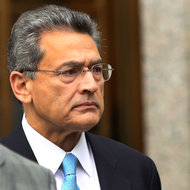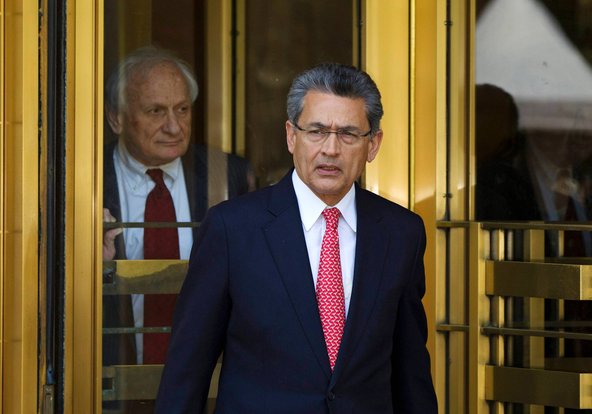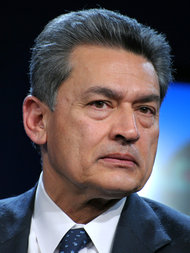 Spencer Platt/Getty ImagesRajat K. Gupta was sentenced to two years in prison for leaking boardroom secrets to a former hedge fund manager.
Spencer Platt/Getty ImagesRajat K. Gupta was sentenced to two years in prison for leaking boardroom secrets to a former hedge fund manager.
A former Goldman Sachs director Rajat K. Gupta can remain free on bail while he challenges his insider-trading conviction, a federal appeals court ruled on Tuesday.
In a surprise decision, the United States Court of Appeals for the Second Circuit in Manhattan ruled that Mr. Gupta will not have to report to prison until his appeal his heard, a process that can take as long as a year. He was set to start serving his two-year sentence on Jan. 8.
Mr. Gupta, 64, was found guilty in June of leaking Goldman’s boardroom secrets to his friend, the hedge fund manager Raj Rajaratnam.
Tuesday’s ruling suggests that Mr. Gupta persuaded the judges that he has legitimate issues to argue on appeal. The same federal appeals court had denied a request by Mr. Rajaratnam to remain free on bail pending his appeal. Mr. Rajaratnam is serving an 11-year prison term.
Mr. Gupta’s lawyers are expected to make several arguments in pushing for his conviction to be overturned. The most significant issue on appeal is expected to be the government’s use of the wiretaps during the trial. Judge Jed S. Rakoff, the trial-court judge, allowed the jury to hear incriminating wiretapped conversations involving Mr. Rajaratnam and his traders that suggested he had a source inside of Goldman.
”I heard yesterday from somebody who’s on the board of Goldman Sachs that they are going to lose $2 per share,” said Mr. Rajaratnam to one of his colleagues, on a wiretapped call, in October 2008.
Multimedia: Insider Trading
Without the wiretaps, prosecutors would have had to rely on circumstantial evidence — telephone bills and trading records — to prove their case.
Mr. Gupta’s lawyers had argued that because the conversations were between Mr. Rajaratnam and his employees, the judge should declare them inadmissible hearsay evidence, meaning that they were too unreliable to be used against Mr. Gupta.
Another issue that Mr. Gupta’s lawyers are expected to raise is that Judge Rakoff erred in curbing testimony by Mr. Gupta’s daughter about her father’s deteriorating relationship with Mr. Rajaratnam.
Mr. Gupta, who lives in Westport, Conn., has been free on $10 million bail since his arrest in October 2011. In addition to a team of lawyers from Kramer Levin Naftalis Frankel that have been representing him, Mr. Gupta hired Seth P. Waxman, a noted appellate lawyer, to help handle his appeal. Mr. Waxman, a partner at WilmerHale, is a former United States solicitor general who has argued more than 50 cases before the United States Supreme Court.
The court is expected to hear Mr. Gupta’s appeal this spring.
Article source: http://dealbook.nytimes.com/2012/12/04/former-goldman-director-gupta-to-stay-free-pending-his-appeal/?partner=rss&emc=rss







